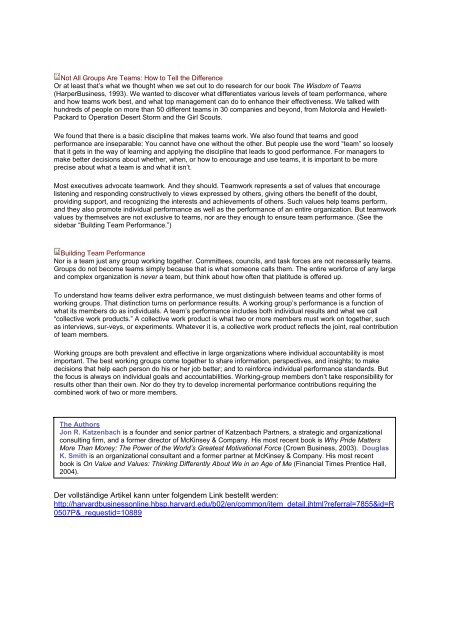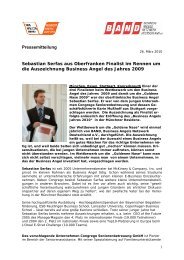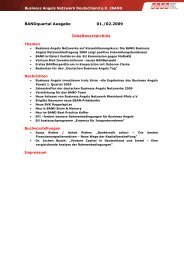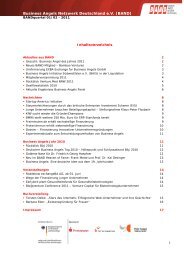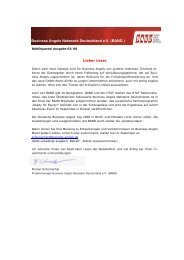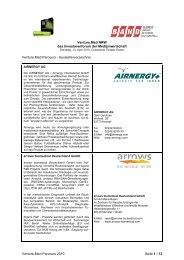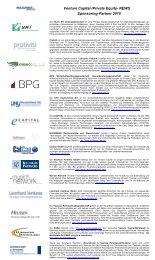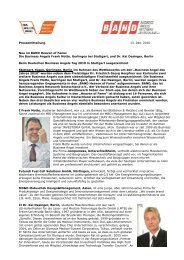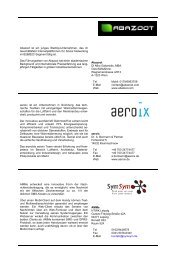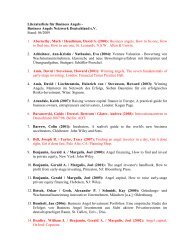The Discipline of Teams
The Discipline of Teams
The Discipline of Teams
You also want an ePaper? Increase the reach of your titles
YUMPU automatically turns print PDFs into web optimized ePapers that Google loves.
Not All Groups Are <strong>Teams</strong>: How to Tell the Difference<br />
Or at least that’s what we thought when we set out to do research for our book <strong>The</strong> Wisdom <strong>of</strong> <strong>Teams</strong><br />
(HarperBusiness, 1993). We wanted to discover what differentiates various levels <strong>of</strong> team performance, where<br />
and how teams work best, and what top management can do to enhance their effectiveness. We talked with<br />
hundreds <strong>of</strong> people on more than 50 different teams in 30 companies and beyond, from Motorola and Hewlett-<br />
Packard to Operation Desert Storm and the Girl Scouts.<br />
We found that there is a basic discipline that makes teams work. We also found that teams and good<br />
performance are inseparable: You cannot have one without the other. But people use the word “team” so loosely<br />
that it gets in the way <strong>of</strong> learning and applying the discipline that leads to good performance. For managers to<br />
make better decisions about whether, when, or how to encourage and use teams, it is important to be more<br />
precise about what a team is and what it isn’t.<br />
Most executives advocate teamwork. And they should. Teamwork represents a set <strong>of</strong> values that encourage<br />
listening and responding constructively to views expressed by others, giving others the benefit <strong>of</strong> the doubt,<br />
providing support, and recognizing the interests and achievements <strong>of</strong> others. Such values help teams perform,<br />
and they also promote individual performance as well as the performance <strong>of</strong> an entire organization. But teamwork<br />
values by themselves are not exclusive to teams, nor are they enough to ensure team performance. (See the<br />
sidebar “Building Team Performance.”)<br />
Building Team Performance<br />
Nor is a team just any group working together. Committees, councils, and task forces are not necessarily teams.<br />
Groups do not become teams simply because that is what someone calls them. <strong>The</strong> entire workforce <strong>of</strong> any large<br />
and complex organization is never a team, but think about how <strong>of</strong>ten that platitude is <strong>of</strong>fered up.<br />
To understand how teams deliver extra performance, we must distinguish between teams and other forms <strong>of</strong><br />
working groups. That distinction turns on performance results. A working group’s performance is a function <strong>of</strong><br />
what its members do as individuals. A team’s performance includes both individual results and what we call<br />
“collective work products.” A collective work product is what two or more members must work on together, such<br />
as interviews, sur-veys, or experiments. Whatever it is, a collective work product reflects the joint, real contribution<br />
<strong>of</strong> team members.<br />
Working groups are both prevalent and effective in large organizations where individual accountability is most<br />
important. <strong>The</strong> best working groups come together to share information, perspectives, and insights; to make<br />
decisions that help each person do his or her job better; and to reinforce individual performance standards. But<br />
the focus is always on individual goals and accountabilities. Working-group members don’t take responsibility for<br />
results other than their own. Nor do they try to develop incremental performance contributions requiring the<br />
combined work <strong>of</strong> two or more members.<br />
<strong>The</strong> Authors<br />
Jon R. Katzenbach is a founder and senior partner <strong>of</strong> Katzenbach Partners, a strategic and organizational<br />
consulting firm, and a former director <strong>of</strong> McKinsey & Company. His most recent book is Why Pride Matters<br />
More Than Money: <strong>The</strong> Power <strong>of</strong> the World’s Greatest Motivational Force (Crown Business, 2003). Douglas<br />
K. Smith is an organizational consultant and a former partner at McKinsey & Company. His most recent<br />
book is On Value and Values: Thinking Differently About We in an Age <strong>of</strong> Me (Financial Times Prentice Hall,<br />
2004).<br />
Der vollständige Artikel kann unter folgendem Link bestellt werden:<br />
http://harvardbusinessonline.hbsp.harvard.edu/b02/en/common/item_detail.jhtml?referral=7855&id=R<br />
0507P&_requestid=10889


